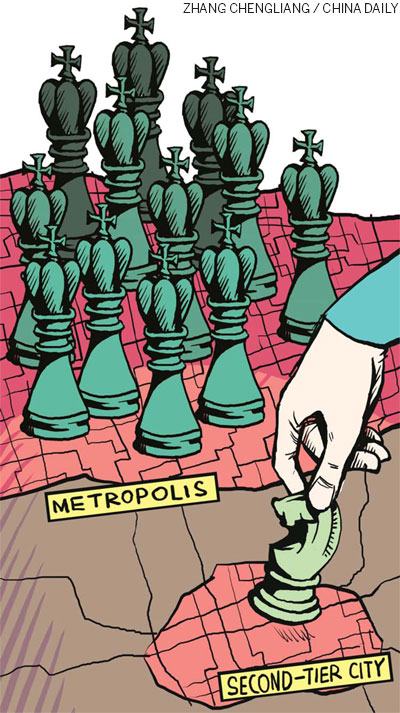Comment
Making the smart move
By Renee Haines (China Daily)
Updated: 2010-08-11 08:59
 |
Large Medium Small |

There have been several articles in print and on the Internet that imply that some young people are being forced to leave Beijing as if they were failures.
That's nonsense.
When many of the young people who dreamed of making a name for themselves in the capital change their minds and head to smaller, less expensive cities, it's not losing face. It's a really smart decision.
These young people are just too smart to pay sky-high prices for an apartment or waste hours - adding up to years - of their lives on long commutes.
In overcrowded, overpriced cities like Beijing, these young people represent a new generation of young, middle class pioneers that might inspire a smarter, better future for urban development in China.
Recent reports and surveys point out that buying an apartment in Beijing can cost 20 times the annual salary of an average worker. By comparison, in Tokyo, the average resident pays eight times his annual salary for an apartment.
So is it any wonder that college-educated men and women in their 20s and 30s are leaving Beijing and opting for smaller cities where they can afford to buy a home, have a family and live a less stressful life.
In China, families can only "own" a property for 70 years, anyway. After that, it reverts back to government ownership. So the ability to buy a home that can be passed along to succeeding generations, as is the case in the United States and other Western countries, doesn't exist in China. This makes an investment in an apartment with an expensive price tag for what basically is a 70-year deed even less appealing.
So, smaller cities are benefiting from welcoming a new, highly educated class of residents who are smart enough to choose not to live in cramped quarters just because they started out telling their families or themselves that they would strike it rich in Beijing.
In other big cities around the world, when the college-educated class gets forced out because of a high cost of living, smart businesses sometimes move away too, in order to be closer to that smarter workforce and to benefit from lower commercial rents.
When that happens, mega-cities become less congested, and outlying suburbs and smaller cities further away become more self-sustaining with a mix of new residents and businesses.
Mega-cities that don't want to lose all their middle-class professionals then begin providing more affordable housing to attract professionals to stay.
In Beijing, where there are now plenty of luxury apartments and high-end shopping centers and more under construction, providing more affordable housing would be a very positive development to serve middle-class residents, certainly more beneficial to the city than focusing on a much smaller population of wealthy residents.
Beijing's professionals who are leaving are educated people making practical, independent decisions to choose a less expensive and more fulfilling life, regardless of any earlier plans announced to friends, parents or themselves.
This is the kind of flexible, independent thinking that helps national economies grow, as well as cities. So hurray for them and for the positive effect they surely will have on smarter urban development, wherever they choose to live in China.
| 分享按钮 |